Tamar has very kindly provided the following notes on our discussion of Sarah Waters’ novel Affinity.
Warning: spoilers!
The group had a lively discussion about Sarah Waters’ 1999 novel, Affinity. Paradoxically, we began by discussing the ending, and our reactions to it. While some of us declared we had never believed in the possibility of magic, that it might actually exist within the world of the novel, others had, and were more likely to empathise with the heroine, Margaret. The sceptics found that they were somewhat detached from her, prevented from fully engaging with the character because of her gullibility over this point.
It was noted that the particular world Waters evoked Margaret inhabiting – brilliantly, we agreed – was stifling in its privilege. It was a closed world, and she was unwittingly yet inevitably forced into her position of ignorance and naivety because of this. The narrowness of her horizons accounted for her belief in, her desire for, the possibility of magic being real. We felt that though the “magic” was achieved through cynical manipulation, perhaps having a working class character who managed to be in charge of events, her own and others’ destinies, would seem like sorcery within the novel’s world. Throughout, Ruth played her class-based invisibility to her own advantage, using it to manipulate the people who literally could not see her possessing subjectivity.
We then pondered whether the novel was Gothic? There was more agreement on this, with group members unanimous in seeing Affinity fitting within the Gothic genre. It possessed many of the usual tropes, characters and narrative patterns. It was easy to read Millbank, the prison as a very Gothic building, fitting with the customary locus of the Old Dark House of books and films. As Joanna Russ lays out in her template of the 70s paperback Gothics, the cast and setting of these are permanent, fixed:
To a large, lonely, usually brooding House (always named) comes a
Heroine who is young, orphaned, unloved and lonely. She is shy
and inexperienced…. (Russ, 1973:667)
We also noted that the prison as described seemed alive, organic – wet, cold, animate – which reminded us of the infested space ships in Alien and Aliens, two further films we would claim as inspired by the Gothic.
Affinity also placed the Gothic’s usual significance on keys – though put to an ingenious use, multiplying the usual locked door via all the cells in the prison – and a dead parent, here the father, rather than the original Gothic’s more usual mourned mother. The novel also perpetuated the Gothic’s habitual play with doubles, as Margaret in the house was paired with Selina in prison, and, eventually, with Ruth, as the latter emerged as Selina’s true beloved, her real “affinity”.
We did wonder if the novel could be described as participating fully in the Gothic genre when its seemed that the phallic observation tower at the centre of Millbank was the only overt symbol of a powerful patriarchy operating in Affinity. Indeed, while as usual in the genre all women were victims in its world, yet there was no dominant husband or father figure; although Margaret’s brother did control her money, this seemed to be his only power over her or other women in the family. Unusually for the genre, the men characters were peripheral, non-powerful, non-threatening. Here the heroine’s unkind and stifling mother replaced the evil husband of the 18th Gothics. We wondered if we could see the novel’s world still being subject to patriarchal rule if there were no dominant men in it, but concluded that, within Affinity, masculine power was so taken for granted that it did not need actual men to impose it: the women characters had internalised its dominion.
We concluded our enjoyable debate by returning to the significance of the novel’s treatment of magic. It was wondered whether the reader herself were betrayed, along with Margaret, if she wanted a happy ending for the heroine and the woman she loved, if she wanted the magic to be real. We did not reach a conclusion about this or whether this might be a flaw in the novel, or a device to makes the reader feel the novel’s actions – perhaps, its tragedy – very acutely. Although we ended without tying down an answer, we all enjoyed reading and discussing Affinity, whatever our final conclusions.
Thanks for the great summary, Tamar!
As ever, do log in to comment, or email me on sp458@kent.ac.uk to add your thoughts.



